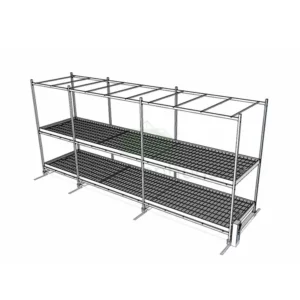Effective operation of Vertical Fix Grow Racks requires a combination of practical skills, technical knowledge, and specialized training. Here are some types of training or education that are necessary for growers:
- Horticultural Knowledge: Understanding basic principles of plant biology, growth cycles, and cultivation techniques is essential for successful operation of Vertical Fix Grow Racks. Training in horticulture provides growers with the foundational knowledge needed to optimize plant growth and productivity.
- Vertical Farming Techniques: Specific training in vertical farming methods is crucial for maximizing the potential of Vertical Fix Grow Racks. This includes learning about vertical stacking, plant spacing, lighting requirements, and irrigation systems tailored to vertical growing environments.
- Equipment Operation: Training on the operation and maintenance of Vertical Fix Grow Racks and associated equipment is necessary to ensure smooth functioning and prevent downtime. This may involve instruction on setting up racks, adjusting lighting levels, programming irrigation systems, and troubleshooting common issues.
- Environmental Control Systems: Vertical farming often requires precise control of environmental factors such as temperature, humidity, CO2 levels, and airflow. Training in the use of environmental control systems ensures that growers can create and maintain optimal growing conditions for their crops.
- Lighting Technology: Understanding different types of grow lights, their spectrum, intensity, and placement is essential for maximizing photosynthesis and plant growth in Vertical Fix Grow Racks. china Vertical Fix Grow Racks Training on lighting technology helps growers select the most suitable lighting solutions for their specific crops and growing conditions.
- Nutrient Management: Proper nutrient management is critical for healthy plant growth in vertical farming systems. Training in hydroponic or aeroponic systems, nutrient solutions, and pH management equips growers with the skills to optimize nutrient delivery and prevent nutrient deficiencies or imbalances.
- Pest and Disease Management: Training in integrated pest management (IPM) techniques is necessary to identify, monitor, and control pests and diseases in vertical farming environments. Growers learn how to implement preventive measures, use biological controls, and apply safe and effective pesticides when necessary.
- Data Analysis and Monitoring: Vertical farming often involves the use of data monitoring systems to track plant growth, environmental conditions, and resource usage. Training in data analysis techniques enables growers to interpret data, identify trends, and make informed decisions to optimize crop yields and resource efficiency.
- Food Safety and Quality Assurance: Training in food safety practices, sanitation protocols, and quality assurance standards is essential for ensuring that crops grown in Vertical Fix Grow Racks meet regulatory requirements and consumer expectations for safety and quality.
- Continuous Learning and Professional Development: Given the rapid evolution of vertical farming technology and practices, ongoing training and professional development are essential for growers to stay updated on the latest advancements, best practices, and industry trends.
By investing in comprehensive training and education programs, growers can acquire the knowledge and skills needed to effectively operate Vertical Fix Grow Racks and achieve success in vertical farming endeavors.
